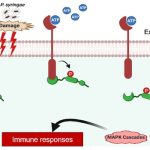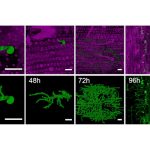Plant Cell Webinar: RNA Biology (Part 2)
Plant Cell Webinar: RNA Biology (Part 2)
Celebrating the June 2023 Focus Issue on RNA Biology
Recorded Wednesday, June 28, 2023
About This Webinar
If DNA is the playbook of life, then RNA, in all its forms, is the company of actors that brings life into being. RNA is likely the original organic molecule that gave rise to DNA as well as enzymes and other proteins that create the flow of genetic information known as the central dogma (DNA -> RNA -> protein). Although the central dogma still holds true generally, our understanding has expanded the concept to encompass reverse transcription of RNA to DNA, regulatory functions of noncoding RNAs, and epigenetic modifications.
Focus Issue editors Mike Axtell, Andrea Barta, Xuemei Chen, Nan Eckardt, Brian Gregory, Hongwei Guo, Pablo Manavella, Blake Meyers, and Becky Mosher have organized two webinars to celebrate this topic. This second webinar features speakers Lisha Shen, Jérémie Bazin, and Vinay Nagarajan, who share findings from their work appearing in this Focus Issue. The webinar is hosted by Plant Cell Guest Editor Rebecca Mosher and moderated by Assistant Features Editor Nora Flynn.
SPEAKERS
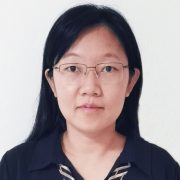 Lisha Shen: Functional interdependence of subunits of the m6A methyltransferase complex in Arabidopsis
Lisha Shen: Functional interdependence of subunits of the m6A methyltransferase complex in Arabidopsis
Lisha Shen received her BS degree from Shanghai Jiao Tong University (China) in 2006 and PhD degree from National University of Singapore (NUS) in 2010. She joined Temasek Life Sciences Laboratory (TLL) as a Research Fellow in 2011. She established her independent research group in TLL in 2018. Her major research interest is in RNA modifications in plant development.
 Jérémie Bazin: Synergistic action of the Arabidopsis spliceosome components PRP39a and SmD1b in promoting post-transcriptional transgene silencing
Jérémie Bazin: Synergistic action of the Arabidopsis spliceosome components PRP39a and SmD1b in promoting post-transcriptional transgene silencing
Jérémie Bazin is a researcher at the National Research Institute for Agriculture, Food and the Environment (INRAE) and the Institute of Plant Sciences (IPS2), Paris-Saclay (France). He was recruited to join Martin Crespi’s team in 2021. Jérémie completed his Ph.D. at Pierre and Marie Curie University (France) focusing on the post-transcriptional regulation of gene expression controlling seed dormancy. He conducted postdoctoral work in the group of Julia Bailey-Serres at the University of California-Riverside (US), on the function of non-coding RNAs in plant environmental responses. Today, Jérémie is interested in understanding the role of alternative RNA splicing in plant stress responses. He aims to understand the regulatory mechanisms that determine the specificity of alternative splicing and the contribution of this process to the evolutionary adaptation of plants to their environment, in particular in the context of climate change.
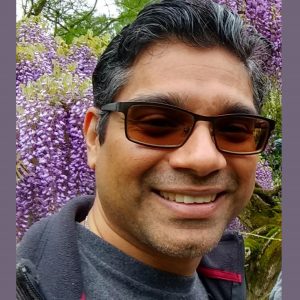 Vinay Nagarajan: RNA degradome analysis reveals DNE1 endoribonuclease is required for the turnover of diverse mRNA substrates in Arabidopsis
Vinay Nagarajan: RNA degradome analysis reveals DNE1 endoribonuclease is required for the turnover of diverse mRNA substrates in Arabidopsis
Vinay Nagarajan is a scientist at Syngenta, North Carolina (US). Vinay earned his Ph.D. from Purdue University, Indiana, (US) under the direction of K.G. Raghothama in the Department of Horticulture. He joined the lab of Pamela Green at the University of Delaware (US) initially as a postdoctoral researcher, then continuing as an Associate Research Scientist. His research work while in the Green lab focused on the characterization of eukaryotic ribonucleases involved in mRNA turnover by globally capturing ribonuclease substrates using RNA degradome approaches.
HOST
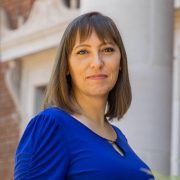 Rebecca Mosher, The Plant Cell Guest Editor
Rebecca Mosher, The Plant Cell Guest Editor
Rebecca Mosher is a Professor in the School of Plant Sciences at the University of Arizona. She earned a PhD from the Duke University Program in Genetics and Genomics and completed postdoctoral work with Sir David Baulcombe, at the Sainsbury Laboratory in Norwich and at the University of Cambridge, UK. Dr. Mosher’s research group uses genetics and genomics to study how small RNA-directed DNA Methylation influences reproductive development in a variety of plant systems.
MODERATOR
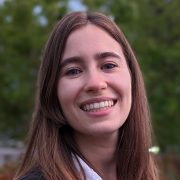 Nora Flynn is a PhD candidate in the Xuemei Chen lab at the University of California, Riverside. She researches plastid gene expression and aims to improve sequencing and visualization technologies for use on plastid transcripts. Recently, Nora received the Graduate Assistance in Areas of National Need (GAANN) Fellowship to develop a method for single-plastid RNA-sequencing by modification of single-cellular strategies. In addition to her research, Nora is committed to science communication and is involved in both public policy and teaching through programs like Science to Policy and School on Wheels.
Nora Flynn is a PhD candidate in the Xuemei Chen lab at the University of California, Riverside. She researches plastid gene expression and aims to improve sequencing and visualization technologies for use on plastid transcripts. Recently, Nora received the Graduate Assistance in Areas of National Need (GAANN) Fellowship to develop a method for single-plastid RNA-sequencing by modification of single-cellular strategies. In addition to her research, Nora is committed to science communication and is involved in both public policy and teaching through programs like Science to Policy and School on Wheels.



